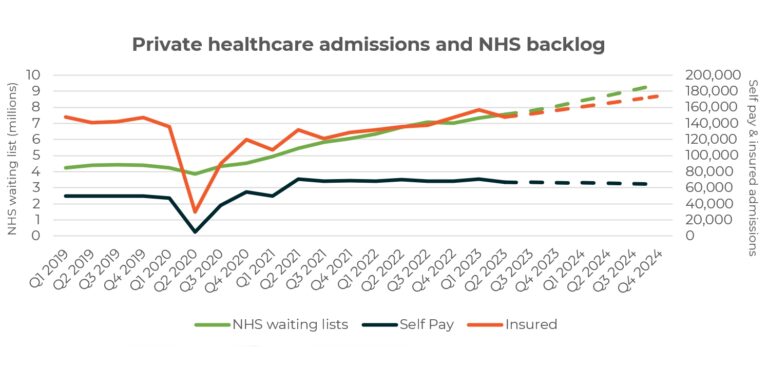One million people could be ‘going private’ with their healthcare by 2025, according to analysis from leading independent consultancy Broadstone.
Looking at quarterly Private Healthcare Information Network (PHIN) data1, Broadstone found that insured admissions for Q3 2022 to Q2 2023 – 590,000 as per the latest data available – increased by 11% compared to the previous year.
If that rate of increase continues, insured admissions could reach around 670,000 in 2024 and over 745,000 in 2025.
The number of people funding their own care has plateaued of late at around 70,000 every quarter but still remains around 20,000 per quarter higher than before the pandemic.
There has been a small decline of late with self-pay admissions falling by 2% for the 12 months to June 2023. Extrapolating this dip suggests that there will be around 260,000 and 255,000 self-pay admissions in 2024 and 2025, respectively. Those projections would take the total number of patients going private to over a million by 2025 for the first time.
Brett Hill, Head of Health and Protection at Broadstone, said: “The pressures in the NHS are impacting millions of people who are struggling to get appointments and must face ongoing health issues in their daily lives.
“In this environment it is little surprise that more people than before the pandemic are paying for treatment out of their own pocket although growth has stabilised in this part of the market.
“Instead, we are seeing a surge in insured admissions as employers either implement or increase coverage of private healthcare options through their employee benefits programmes.”
The growth in demand for employer-arranged health insurance products appears to have been driven by the NHS backlog.
A total of 7.77 million people are now waiting for treatment, according to the latest NHS England data2. If the rate of growth over the past 12 months were to continue at the same pace, then the backlog could be as high as 11 million people by the end of 2025.
“Since the pandemic, waiting lists have been spiralling and any hope of short-term relief appears unlikely. In this ‘new normal’ where the NHS is unable to guarantee the health of the workforce, employers are recognising the need to play a role.
“As such, more employers are helping to cover staff with insurance products like Private Medical Insurance, putting in place screening programmes or Digital GP services to catch issues early or investing in other health-related benefits.
“This is feeding through into the rapid growth in insured admissions which we do not expect to slow as long as people are struggling to access the public health service. Even so, the fact this could soon be the significant contributor to over one million people going private should be a wake up call to our political and health leaders as well as businesses up and down the country.”



